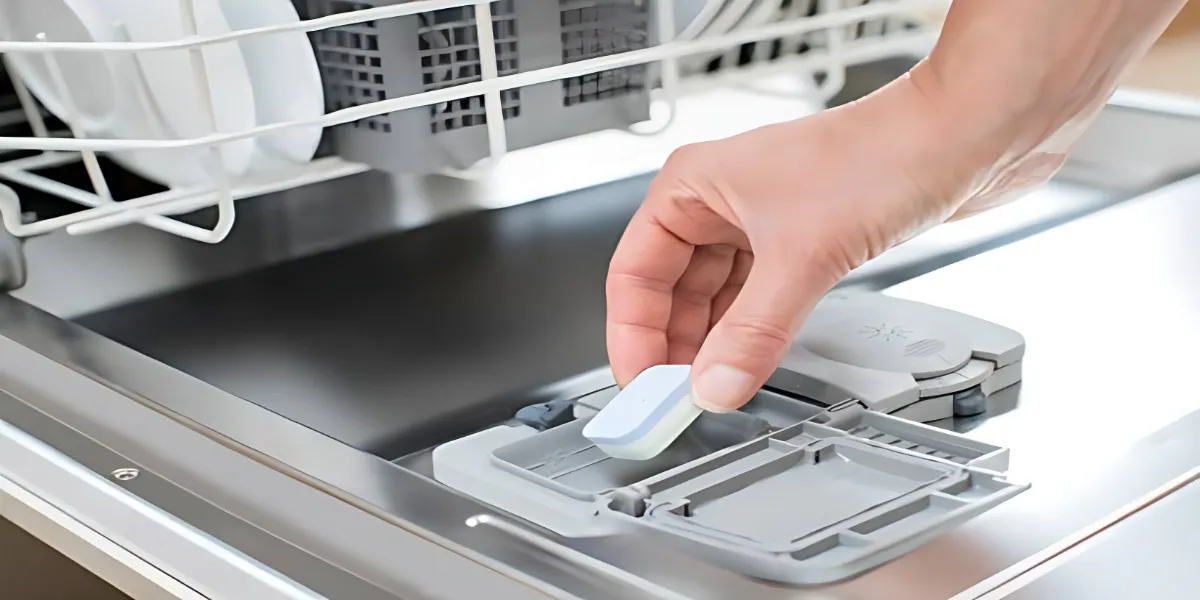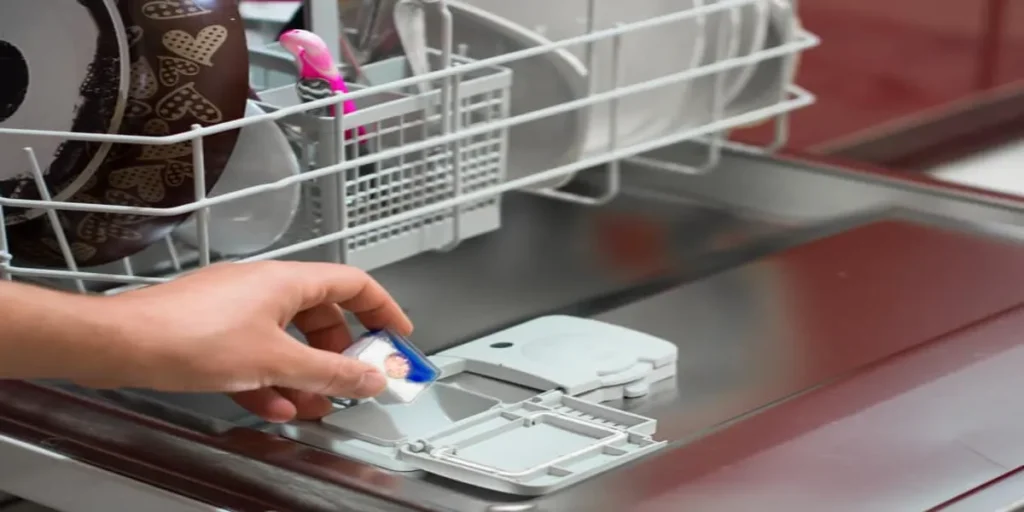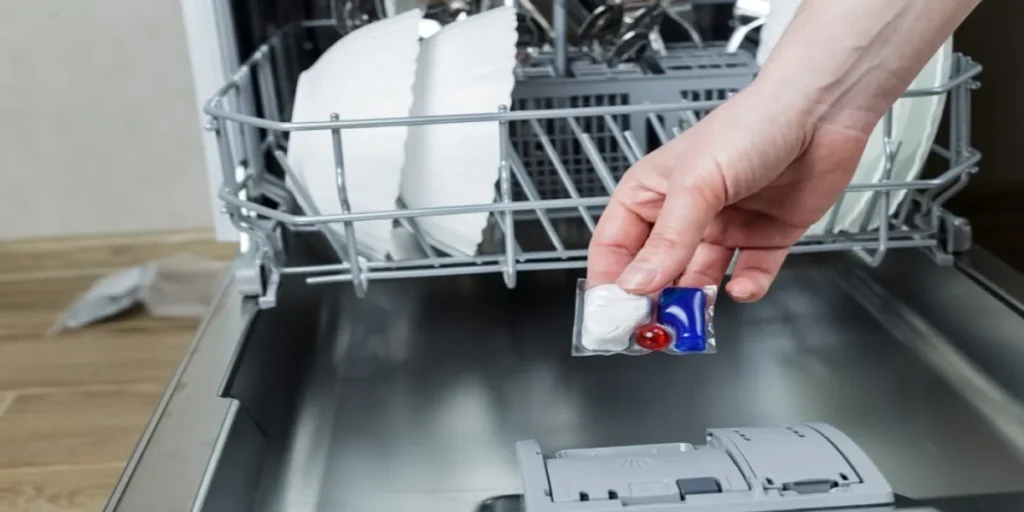Frustrated because your Bosch dishwasher tablet isn’t releasing? You’re not the only one facing this issue.
In this article, we’ll take you through step-by-step troubleshooting tips and maintenance hacks.
Get rid of those half-cleaned dishes and restore your dishwasher’s top performance.

Common Reasons Your Bosch Dishwasher Tablet Isn’t Releasing
Here are some of the common reasons why your Bosch dishwasher tablet isn’t releasing:
Soap Residue
Soap residue is the leftover soap that builds up in your dishwasher over time. It can block the tablet collecting tray, which is where the tablet is supposed to drop during the cycle.
It can also prevent the water from reaching the tablet and dissolving it properly. To avoid soap residue, you should clean your tablet collecting tray with a damp cloth and hot water.
You should also use the right amount of tablet for your load size and water hardness.
Faulty Dispenser
The dispenser is the part of your dishwasher that holds and releases the tablet during the cycle. It has a door that opens and closes with a latch or a spring mechanism.
Sometimes, the dispenser can malfunction or break due to wear and tear or damage from a power outage. This can cause the door to not open or close properly, or not at all.
To fix a faulty dispenser, you should check if the latch or spring is working properly and replace it if needed.
You can find online tutorials on how to do this yourself or call a professional technician for help.
Incorrect loading
Incorrect loading is when you put too many dishes or large items in your dishwasher that block the water flow or the tablet collecting tray.
This can prevent the tablet from dropping into the tray or getting enough water to dissolve. You should follow the instructions on how to load your dishwasher properly.
You should also make sure that nothing is blocking the spray arms or the tablet collecting tray.
Water Temperature Issues
Water temperature issues are when the water in your dishwasher is too cold or too hot for the tablet to dissolve properly.
If the water is too cold, the tablet may not dissolve at all or leave a chalky residue on your dishes. If the water is too hot, the tablet may dissolve too quickly or melt the dispenser door.
You should check if your water heater is working properly and set it to between 120°F and 150°F. You should also run a hotter cycle to see if that helps.
Using Wrong Type of Tablet
Using the wrong type of tablet is when you use a tablet that is not compatible with your dishwasher model or cycle type.
Some tablets are designed for specific dishwashers or cycles, such as eco-friendly tablets, gel tablets, or Powerball tablets.
If you use the wrong type of tablet, it may not release or dissolve properly in your dishwasher. You should check if your tablet is suitable for your dishwasher model and cycle type.
You should also read the instructions on the tablet package and follow them carefully.
Steps to Troubleshoot a Bosch Dishwasher Tablet Not Releasing

There are some simple steps you can take to troubleshoot and fix your Bosch dishwasher tablet. Here’s what you should do:
1. Inspecting the Dispenser
The first thing you should do is inspect the dispenser to see if it is working properly.
You should open and close the dispenser door manually and see if it snaps shut and opens easily. You should also check if there is any damage or dirt on the door or the latch.
If you find any problem with the dispenser, you should try cleaning it with a damp cloth and hot water. If that doesn’t work, you should replace the latch or the door.
2. Checking Water Temperature
The next thing you should do is check the water temperature in your dishwasher. You should use a thermometer to measure the water temperature at the beginning and the end of the cycle.
You should also check if your water heater is working properly and set it to between 120°F and 150°F.
If the water temperature is too low or too high, you should adjust it accordingly. You should also run a hotter cycle to see if that helps.
3. Examining the loading
The third thing you should do is examine the loading of your dishwasher. You should make sure that you are not overloading or underloading your dishwasher.
You should also make sure that you are placing your dishes and utensils in the right racks and baskets. You should also make sure that nothing is blocking the spray arms or the tablet collecting tray.
If you find any problem with the loading, you should rearrange your dishes and utensils accordingly.
4. Testing Different Tablets
The fourth thing you should do is test different tablets to see if they work better in your dishwasher.
You should try using different brands, types, and sizes of tablets and see if they release and dissolve properly in your dishwasher.
You should also read the instructions on the tablet package and follow them carefully. If you find a tablet that works well in your dishwasher, you should stick to it and avoid switching to other tablets.
5. Seeking Professional Help
The fifth thing you should do is seek professional help if none of the above steps work or if you are not comfortable doing them yourself.
You should contact Bosch customer service to book a service visit or find a local servicer online.
A professional technician can diagnose and fix your dishwasher problem using specialized tools and skills.
Maintenance Tips for Long-term Reliability

Here are some tips to maintain your dishwasher for long-term reliability:
Regular Cleaning
Regular cleaning can help keep your dishwasher in good condition and prevent soap residue, dirt, and odors from building up.
You should clean your tablet collecting tray, dispenser, filter, spray arms, door seal, and interior walls regularly with a damp cloth and hot water.
You should also run a cleaning cycle with vinegar or a dishwasher cleaner once a month to remove any hard water deposits or grease.
Proper Loading Techniques
Proper loading techniques can help improve the water flow and the tablet release in your dishwasher. You should follow the instructions on how to load your dishwasher properly.
Do not overload or underload your dishwasher, place large items or utensils in the spray arms, or stack dishes too close together.
Ideal Water Settings
Ideal water settings can help ensure that the tablet dissolves properly and cleans your dishes effectively.
You should check if your water heater is working properly and set it to between 120°F and 150°F.
You should check if your water hardness is suitable for your dishwasher and adjust it if needed. You should also run a hotter cycle if your dishes are very dirty or greasy.
Periodic Inspections
Periodic inspections can help detect and prevent any potential problems with your dishwasher parts.
Inspect your dispenser, tablet collecting tray, spray arms, filter, drain hose, valve, heater, motor, and wiring regularly for signs of wear and tear.
You should also replace any faulty parts as soon as possible.
FAQs on Bosch Dishwasher Tablet Not Releasing
Can hard water affect the release of dishwasher tablets in a Bosch dishwasher?
Mineral deposits and buildup in hard water may interfere with the operation of the detergent dispenser.
When should I clean the Bosch dishwasher detergent dispenser?
Regularly inspect and clean the detergent dispenser as part of your dishwasher maintenance routine.
Cleaning it once a month is a good practice to prevent potential issues.
What should be used when a dishwasher tablet consistently won’t release?
If the tablet consistently doesn’t release, you can use alternative dishwasher detergents like powder, gel, or liquid.
Conclusion
You’re not alone if your Bosch dishwasher tablet isn’t releasing. Check the dispenser latch, inspect the spray arms, and don’t forget to verify the water temperature.
These quick fixes often solve the issue, saving you time and money on unnecessary repairs. Happy dishwashing!

